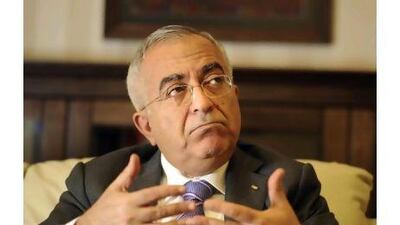RAMALLAH // If nothing else, Salaam Fayyad is reasonable, a trait that befits a man who is a trained economist and has spent more of his life in academia than politics.
Which is why after more than four years of bitter infighting between Hamas and Fatah, the largest faction of the Palestine Liberation Organisation, the prime minister of the Palestinian Authority last month invited the Gaza Strip's Islamist rulers to join a national unity government.
The PLO and the United States, his most important political and financial backer, were not happy. Nor, to say the least, was Israel, which has viewed Mr Fayyad as someone whom it can "deal with".
But with the possibility looming that the feud could block the path to Palestinian statehood for yet another generation of Palestinians, the 58-year-old prime minister put aside his personal aversion for Hamas and extended it an olive branch.
Not surprisingly, Mr Fayyad this week called his overture to Hamas "pragmatic".
"It's not ideal, but what I'm proposing represents a vast improvement over what exists right now," he said during an interview in his Ramallah office.
Under Mr Fayyad's plan, the PA and Hamas would recognise one other's security control over their respective territory - the PA in the West Bank and Hamas in the Gaza Strip - and would join a national unity government predicated on nonviolence.
Mr Fayyad dismisses critics who say his timing and priorities are wrong.
"Many people have told me, 'This is too theoretical. How do you intend to prepare for statehood under occupation, an oppressive occupation, with its capricious control regime and all?'" he said, referring to Israel's military control of land that Palestinians claim for their own state.
"But that's thinking statically. You can't wait until you get the perfect alignment of the stars."
Mr Fayyad believes it is important for Hamas to participate in presidential and legislative elections, which are expected to be held by September. During the last round of legislative elections in 2006, Hamas won a majority 74 seats in the Palestinian Legislative Council, setting off an intense political stalemate that culminated in a brief civil war.
"We want these elections to be inclusive. They will be fair and transparent. It is up to Hamas whether it wants to participate, but we would want Hamas to participate, that's for sure," he said.
Some Hamas officials, however, have rejected the balloting that would lead to a national unity government. So, too, have PLO members, including Amin Maqboul, the secretary-general of Fatah's Revolutionary Council, who was reported in the Jerusalem Post on Sunday to have called the idea of unity government with Hamas "unreasonable and unacceptable".
Time and geography are working against the naysayers, according to Mr Fayyad.
"With each passing day the separation becomes more part of the reality of the Palestinian landscape," he said. "This is the fourth year of separation, and we think that elections can be an instrument for unification."
Mr Fayyad has numerous critics. They say he is too enamoured of American power and that his government has been caught flat-footed by the upheaval and demands for change sweeping Middle East.
"Our problem with his platform, his policies, are political, economic and social," said Khalida Jarrar, who is with the Popular Front for the Liberation of Palestine, a PLO faction.
"I mean, he is an appointed figure, not one who is popularly elected by the Palestinian people."
Mr Fayyad insists, however, that his political and economic agenda echo the aspirations that have fueled the popular uprisings in Tunisia and Egypt - the yearning for "citizenship rights", improved living conditions, more job opportunities and accountable government. "Government has to be responsive to people's aspirations and needs, and people have to feel it," he said.
He ticked off a list of Palestinian achievements: "More than 2,000 kilometres of new, paved roads, 180 new schools, institutions that are functioning well in their own areas of jurisdiction but then they are coordinating very well."
Like almost everyone else in the region, Palestinians are caught up in the ferment, he said.
"It appears as though we will be rolling with this change in a positive way, in a way that will ultimately help us do our job better."

